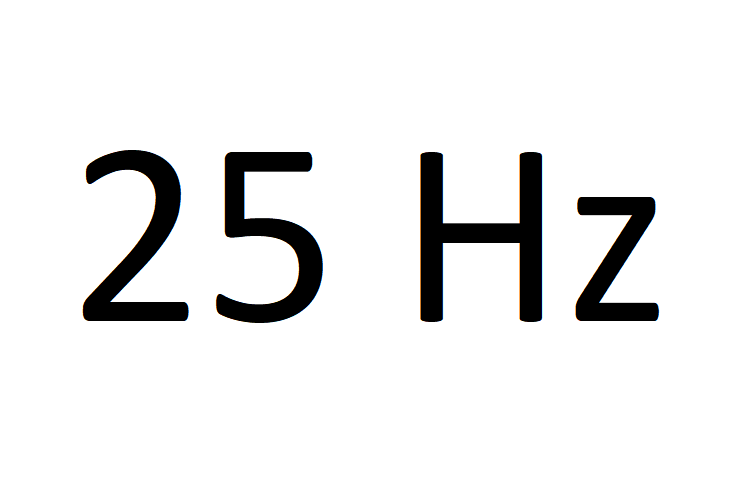My biggest gripe with cooking instructions is the non-specificity. “Stir pasta frequently”? How frequently? How continuously? Tell me in unit Hertz
Maybe a graph of how strong the bond gets over time for 2 elements?
What kind of dumb instructions are that?
Stirring exactly once is enough in most cases.
I won’t accept my pasta at anything lower than 120Hz.
Not sure your pasta will survive that kind of speeds…
They just pasta way
Oh gnocchi didn’t.
only 120hz?! I refuse to eat any pasta below 2.4ghz
Those are some loose standards… I only accept pasta at 1.21 Jiggawatts and 88mph.
Just imagine the chaos when you run the microwave at the same time!
The human eye cannot see more than 24Hz, so why bother
Sooo…just curious how you explain this?

Just another of those internet image optical illusions. You won’t be fooling anyone on here 🧐
I don’t understand the basis of the 24Hz limit rumor. My monitors are 144Hz, and if I limit them to 60Hz and move my mouse around I see fewer residual mouse cursors “after-images” than I do at 144Hz. That’s a simplified test that shows that the eye can perceive motion artifacts beyond 60Hz.
The eye can perceive LEDs that are rectified at 60Hz AC, it’s very annoying.
I think it’s the limit for what most people can see as jittery motion. You may be able to differentiate between higher FPS settings, but above 24 hertz most people shouldn’t be able to see discrete steps.
That’s at least how I’ve come to understand it
I could never tell if people who were claiming not seeing more than the 24 Hz/FPS thing were serious or just excusing poor game optimization. They were either fanboys defending a poor job of a product, or simply had terrible eyes. But I think even with the latter you’d still be able to tell the difference in smoothness.
It’s one of those things that once you experience a higher framerate in games it’s very hard to go back to a lower setting.
I find it hard to get used to in movies/shows though. My TV has an option to insert frames for smoother playback to make it appear a higher Hz, but it often looks unnatural. It was hard getting used to The Hobbit movie (I think it was Desolation of Smaug) that was in 48 FPS. And Avatar: Way of Water was constantly switching between lower and higher frames for regular and action scenes, it was such a jarring experience.
iirc 24hz is just the minnimum thta the movie industry found creates the illusion of a moving image.
I believe 24Hz works in movies because the way cinemas are set up. The image projected onto canvas in a dark/dim room “burn” in (not sure what the correct term is) which can make it appear smoother. This is why they can get away with it in cinemas. Plus it’s also a consistent 24Hz, which in games (and Way of Water) isn’t.
People used this excuse for games, to make games more “cinematic”, but that was just an absolute horseshit excuse for games being poorly optimised. Especially if the framerate wasn’t locked to 24FPS, and because home monitors and TVs don’t work the same as cinema projectors.
I’m sure if all cinemas and media would move to a higher framerate/Hz it would eventually just feel normal though. It just often takes a lot of time getting used to, especially for cinema experiences.
I used to have a 4k tv I used as a monitor. It was 60hz. When I was tired, my eyes would vibrate back and forth trying to play nice with the frame rate, blurring everything up. Very difficult to read. Huge increase in headaches.
Switched to 120hz tv (all other specs equal) and the problem stopped entirely and hasn’t resurfaced in the 6 years since.
A person may not notice it directly, but it does matter.
I don’t really notice in movies and stuff but those are so damned chaotic anyway that it probably really doesn’t matter as much. (I don’t like live action, it’s difficult af to follow)
I haven’t noticed in games really but i mostly play console where that’s not really something you can usually tweak
It’s often weird how people don’t notice it much when you turn a setting on or off. But then I usually whip out the UFO site and they’re immediately convinced (it’s also easier to explain).
I have to say that on the PS5 the framerate differences have been quite noticeable. Especially first-party titles that support performance mode to go up to 60+ FPS instead of a usually locked 30, like in God of War and Horizon games.
I haven’t really run into ps5 issues, but then physical media is very difficult to find for 5, so I only have 4 games for ps5 vs 50+ for ps4 (I don’t buy digital games, ever).
But I guess I don’t really pay much attention to it either. As long as it works well enough I don’t usually mess with the display settings other than turning gama waaaaaaay up so I can see shit properly… my tv doesn’t support hdr, which I think became standard in 2017, or anything newer than that which newer games are built to use, so I mostly just leave the defaults alone. I definitely notice some games are smoother than others, but that could just as easily be the texture pack or resource utilization as well.
Back when I was playing games on my phone, I’d actually turn down the refresh… sure this game can run at 120, but it can also run at 30 or 60, let’s see what the lowest I can stand is! I don’t do that anymore, but it was good for battery life :)
24hz is the lower limit. People will perceive 24hz as a smooth sequence, especially with motion blur, while anything below it will start to look choppy. Of course humans can perceive higher frequencies. But 24hz became the standard because celluloid film is expensive especially in the early days of cinema. The less frames you need to shoot the less film you need to buy and develop. And film back then was probably not sensitive enough for the lower exposure times that come with higher frame rates.
Your eyes are not digital. Nothing physical really is. Think about a camera flash. They can get well under 3.33ms, meaning over 300fps, and you can still see it clearly (and painfully). Same for a monitor, it also has a “response time”. It is how long it takes for a pixel to transition color. (Usually “gray to gray”, as in one shade of gray to another. Black to white would be longer, as is for eyes.)
So ofc you would see all the mice.
It’s also why motion blur is a thing, even though it was usually implemented incorrectly. Seeing every motion on a tv or monitor in perfect sharpness feels weird, because they are pictures not actual movements.
Your brain makes movements out of it all.
Anyway: 16 is minimum, 24 is good for most movies, 30 for slower games, 60 minimum for fps (75 and above for faster fps, even though i played xonotic on 45), 120 for vr.
No it can see much more. Bonus: your brain can ‘see’ more than 100hz too. Google bundesen tva. Source i worked on programs to measure it for my gfs phd. Also i play fps :D
Salt and Oil would do wonders….
Oil is bad for sauces sticking to pasta though.
It’s really the first couple minutes that are critical
Is this a meme I’m too Italian to understand?
Yeah, I also don’t get it. I don’t stir pasta, maybe once in the middle. It never sticks.
Skill issue

Gift

Me who never stirs and never gets sticky pasta…
Stop using butter.
Gross, people do that?
The oil keeps the water from boiling over. The downside is that the sauce won’t stick as well.
it’s indeed gross to stop using butter
Butter is delicious though
No, you are.
This meme is about boiling pasta. You butter before you boil? Weird.
Stirring doesn’t matter. The rinse after really matters for it to not stick together. (I had displeasure of eating a portion from 15kg of pasta slab that had no chance of proper rinse, bottom was charred)
I’ve never rinsed my pasta and it never sticks together.
Are you putting it immiedietely in the sauce?
For me it sticks if I don’t rinse it and leave it alone for later.
Just like me and my bros
I have actually never seen this before. Other comments are saying its because you dont salt your water and i do so probably thats why. It also makes the taste better so overall recommended.
Mario Batali over here.
?
You can add some oil so pasta won’t also stick when you have cold leftovers. I add both oil and salt in the very beginning, because there’s no reason to not do that, and I have a feeling of the right amount compared to the amount of water.
And I stir once, about a minute after putting the pasta in, because something tends to stick to the bottom in the very beginning. Afterwards, it’s just not necessary.You ever heard the saying “like oil and water”? Oil doesn’t mix with water. It floats on the surface. Adding it just wastes 100% of the oil.
deleted by creator
Oh, thank you for providing me with this rare knowledge. But what happens while you boil pasta, is pasta turning around and soaking the oil in. I wouldn’t be doing that if it wouldn’t help with pasta stickiness.
And as other people comment here, oil gets into pasta so you can have a problem with sauce not soaking in, but when I’m making something like bolognese, I sometimes pour pasta into the frying pan with the sauce, so it’s getting there for sure.But what happens while you boil pasta, is pasta turning around and soaking the oil in.
That’s not what happens
wouldn’t be doing that if it wouldn’t help with pasta stickiness.
It doesn’t, it prevents boilover
A wooden spoon across the top of the pot prevents boilover, so why waste the oil?
Yeah people say that but it has literally never worked for me lmao. Great way for me to make a mess
Okay, okay, oil doesn’t help me at all, what am I doing!
I add both oil and salt in the very beginning, because there’s no reason to not do that.
If you really like to impregnate your pasta, so that it won’t absorb your sauce (or less well), then you are right about the there-is-no-reason-part in your answer.
Salty like the ocean
Is bullshit you don’t want that much salt

I’m not saying don’t salt it, just not as salty as the ocean, you just don’t need that much
You do in the water. The pasta won’t absorb all of it
I’ve tried boiling pasta in ocean water. They were inedible.
If the ocean is the baltic sea then it makes sense as it has salt content ranging from 0.5~1.5

Lidia taught me that
It’s that goblin fuck from sin city having an orgy.
That goblin fuck doesn’t have the tools for a proper orgy
Y’all need to salt your water.
It prevents nearly all the sticking and it makes pasta delicious
And while you’re at it, shell out the extra 50 cents or whatever for the bronze cut pasta. It has a much nicer texture and allegedly makes sauce adhere to the pasta more.
Bronze cut cavatappi is the superior macaroni.
It’s not the salt that prevents the sticking. You use a larger pot with plenty of water. Still delicious though :P
Yea, and not cooking it for too long.
Do you not put just a little oil to make them unstick with each other?
Nah that is another myth, it will just make it harder for your sauce to stick to your pasta. Add salt and it won’t stick together.
Your recommended posts, all in one place
Dat feel





















